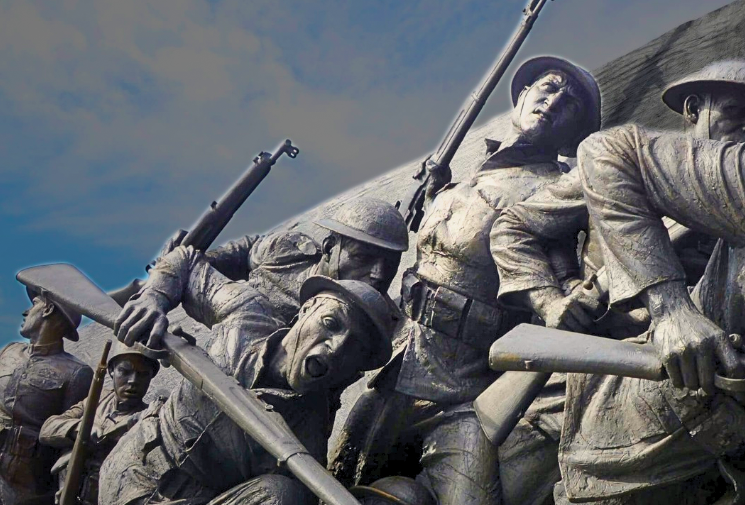The Age of Entitlement: America Since the Sixties
By Christopher Caldwell
(Simon & Schuster, 2020)
From some future vantage point, the constitutional debates of our time may look surprisingly silly. After all, they involve questions like, Which cakes does the law compel us to bake? A baker who puts up his shingle is within his rights to tell a customer who requests a custom wedding cake that he cannot have one for any number of reasons: the shop is overbooked; the proprietor intends to take a vacation; delivery would be too burdensome; they can’t agree on a price; the customer’s requests are not to the proprietor’s aesthetic or culinary taste. That’s just business. But if the baker thinks providing the cake violates his religious scruples, charges may be pressed.
The case of Jack Phillips of Masterpiece Cakeshop proceeded swiftly from the Colorado Civil Rights Commission, which found him to have violated his state’s nondiscrimination law, to the Supreme Court. The swing justice, Anthony Kennedy, felt that the stakes were high. The case “presents difficult questions as to the proper reconciliation of at least two principles,” Kennedy wrote. “The first is the authority of a State and its governmental entities to protect the rights and dignity of gay persons who are, or wish to be, married but who face discrimination when they seek goods or services. The second is the right of all persons to exercise fundamental freedoms under the First Amendment, as applied to the States through the Fourteenth Amendment.”
In other words, the question before the court cut to the core of our political order: What was the controlling law of the land? Were civil rights statutes the highest law, and the Bill of Rights a list of inherited exceptions to it? Or was the Constitution the law of the land, to which nondiscrimination law was the exception? The Colorado Civil Rights Commission followed a twentieth-century revolution in civil rights law all the way up to Justice Kennedy’s opinion in the Obergefell case, which legalized same-sex marriage around the country. Jack Phillips and his legal allies appealed to First Amendment rights of free association, free expression, and free exercise of religion.
Kennedy’s solution was to avoid the conflict. Delivering a paradoxical conclusion, he vindicated Jack Phillips on civil rights grounds. Citing disparaging remarks about religion by members of the Civil Rights Board, Kennedy said the baker “was entitled to a neutral decisionmaker” and didn’t get one. Ingenious!
Was it though? What difference did it make how the board felt about Phillips’s religious beliefs, so long as it applied the law faithfully? No matter, the great conflict was avoided. For now, at least. The ruling, perhaps unintentionally, suggested that Jack Phillips’s First Amendment rights could be taken away by a state commission, so long as it didn’t make Nazi analogies while doing so.
The Age of Entitlement is a tightly telescoped, revisionist history of America from the death of John F. Kennedy to the election of Donald Trump. The protagonist is the Baby Boom generation, and the story follows their journey from teenage years to drafty McMansions to the old folks’ home. Author Christopher Caldwell’s thesis is that the culture war that spans the Boomers’ lives is actually a constitutional conflict. On one side stands “the de jure constitution of 1788, with all the traditional forms of jurisprudential legitimacy and centuries of American culture behind it.” The rival constitution is the modern doctrine of civil rights, “which lacks this traditional kind of legitimacy but commands the near-unanimous endorsement of judicial elites and civic educators and the passionate allegiance of those who received it as a liberation.”
Caldwell’s book doesn’t end, like Kennedy’s ruling, in mere suggestion. The final chapter is entitled “Losers.” Caldwell argues that in 2016, those on the wrong side of the civil rights revolution, increasingly aware of their second-class status, became the coalition that elected Donald Trump. It is not clear whether Caldwell sees Trump as the beginning of a successful counterrevolution or the pathetic gesture of a defeated force. He concludes that “the only way back to the free country of their ideals was through the repeal of the civil rights laws.” Since this is improbable, the deplorables seem like permanent losers despite Trump’s victory.
Ronald Reagan: Progressive Enabler
The Age of Entitlement is strange. It’s a book about how civil rights transformed America since the 1960s, but the midcentury civil rights movement hardly figures in it. In fact, African Americans hardly appear, either. Civil rights, in Caldwell’s telling, are more like white-on-white crime. This is also a conservative book in which Ronald Reagan is cast as an enabler of progressivism. The sexual revolution and plunging native birthrates that made the demographic transformation Caldwell describes so dramatic are a sideshow to the featured story about racial spoils.
Despite this narrowed focus, The Age of Entitlement is immensely readable, mordantly funny, and spellbinding the way the most compelling intellectual essays from Europe tend to be. If overdone in some ways, it serves the reader by being so.
Caldwell forces you to rethink your broad prejudices. His description of the cultural dominance of war veterans from the late 1940s through the early 1960s will make conservatives more sympathetic to the counterculture. The conformism, hokeyness, and sheer repetitiveness in American popular culture is not just described by Caldwell but in various ways quantified. No baseball player wore a beard or mustache between the late 1930s and 1970. Prime time television was almost exclusively for men. By the end of Caldwell’s account of the GI generation in power, even a Buckleyite would long for the Mamas and the Papas.
My own view of Reagan is informed by Mark Lilla’s depiction of the fortieth president as an extension of the 1960s more than a rebuke of it. Caldwell presses Lilla’s point further, charging Reagan with avoiding the social and constitutional fights conservatives were spoiling to have and buying social peace through astronomical amounts of debt. In this telling, Reagan was the savior of the Great Society rather than its opponent. Caldwell gives special attention to the failure of the Immigration Reform and Control Act of 1986, which made promises it failed to deliver and delivered on amnesties it could never have promised.
By the end of the book, however, I felt more sympathetic to Reagan than I was at the beginning. Anyone comparing the state of America and the world in 1989 to the way they were in 1979 would have to think of Reagan as a success and the debt as a small mark against him. America went from the depths of its crisis of confidence over the Soviet invasion of Afghanistan to deftly handling Gorbachev’s slow-motion revolution in Moscow and the signing of a major arms-control treaty. Jimmy Carter’s furtive attempts at deregulation of the economy were expanded.
Even so, it is hard to disagree with Caldwell about the scale of the social revolution that carried Reagan in its wake. Caldwell shows that the drafters of the Civil Rights Act advertised it as a limited measure to rectify one historical wrong. But by empowering a new class of activists, lawyers, and bureaucracies, they made expansion inevitable. “As civil rights spread to cover groups other than blacks, the term ‘people of color’ marked whites off as the only people so excluded, and legitimized that exclusion,” writes Caldwell. “In this sense the United States had re-created the problem that it had passed the Civil Rights Act to resolve: It had two classes of citizens.”
It’s true that civil rights laws empowered this class of activists who had a professional interest in the expansion of enforcement. But this expansion can also be explained by dashed expectations. Civil rights legislation was passed with the hope that clearing all legal obstacles for black Americans would lead to something like social parity. The demands of activists alone would not be sufficient to keep the project going unless others were also moved, scandalized, and guilt-stricken about the parlous condition of black America in the decades after passage. In housing, educational attainment, rates of imprisonment, number of fatherless homes, in total net worth, black America remained apart from white America despite all the supposed help offered to it.
The Unmelting Pot
Caldwell’s book has been received poorly outside conservative circles, as if it were an entirely new provocation. In fact, its view of civil rights’ deficiencies and problems is not altogether different from that of Nathan Glazer, who remained in good standing with polite opinion in his day. Glazer envisioned an America in which ethnic and racial minorities would be integrated into the mainstream without losing their distinctive identities. He then traced the scandal of the American reality that failed to conform to his highest hopes. But pondering a revival of nativism and the rise of left-wing identity politics caused him to embrace civil rights again. Perhaps Glazer could not have foreseen how the unmeltable ethnics would, by law and custom, become simply “white.”
Some of Caldwell’s critics should be obliged to recognize themselves in his work. In the New York Times, Jonathan Rauch criticized The Age of Entitlement as an “overwrought and strangely airless book.” Rauch does not agree with Caldwell’s vision of a zero-sum conflict between these two constitutions. In Rauch’s reading of history, a series of refoundings “sparked tense and sometimes violent clashes between competing views of the Constitution and basic rights, but . . . those tensions proved not only survivable but fruitful, and working through them has been an engine of dynamism and renewal, not destruction and oppression.”
But how long must one wait for the dynamism and renewal to emerge from the tense and sometimes violent clash? Caldwell writes about the cancerous way civil rights legislation outsources the enforcement of government-approved social norms. Rauch himself once made a similar argument. In a passionate essay for the New Republic, Rauch showed how Title VII of the 1964 Civil Rights Act was becoming an acid bath for the First Amendment. He wrote:
The most peculiar thing about workplace-harassment law is not that it has turned the First Amendment on its head, but that it has done so without even trying. Generations of would-be censors—opponents of pornography, sedition, evolutionism, hate-speech, flag-burning, Klan rallies—have charged the First Amendment head-on and broken their necks. But opponents of discriminatory speech, who never paid much attention to the First Amendment, have sleepwalked right past it. At no point, right up to the present, did the courts and government agencies step back and weigh the free-speech implications of what they were doing. They just went step by step.
Such conflicts have not abated in the twenty-three years since Rauch wrote this. When Brendan Eich was ousted as CEO of the software company Mozilla because he donated to Proposition 8 in California, it was taken as axiomatically true that he could not be trusted to judge homosexuals’ work fairly, even though he had never been accused of any act of “bias.” Jack Phillips was told he had a right to a neutral arbiter. But under civil rights law, with its ever-expanding claims of dignity, the right sort of people can demand a positively affirming boss.
Caldwell’s book makes this unwelcome thesis easier to digest. But I couldn’t help thinking that if the battle between America’s two constitutions is as dramatic as Caldwell says, it’s easier to forgive Reagan and Justice Kennedy for avoiding it with financing and finesse. Many Americans would rather the fight continue on at any cost other than admitting defeat.
Michael Brendan Dougherty is a senior writer at National Review and the author of My Father Left Me Ireland.
Founded in 1957 by the great Russell Kirk, Modern Age is the forum for stimulating debate and discussion of the most important ideas of concern to conservatives of all stripes. It plays a vital role in these contentious, confusing times by applying timeless principles to the specific conditions and crises of our age—to what Kirk, in the inaugural issue, called “the great moral and social and political and economic and literary questions of the hour.” Subscribe to Modern Age »













